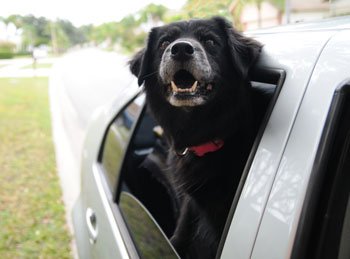Holiday Travel: Preventing motion sickness in pets

The winter holiday season is rapidly approaching which means many families will be rushing on the road to meet their family members both near and far.
According to a recent industry market survey, pet owners are increasingly viewing their pets as human, often referring to them as children or members of the family.[1] This change is reflected in pet parents choosing to bring their family dog on their vacations more often.
Unlike in years past, today 53% of owners will take their dog along for a day trip, and 42% will take their dog with them for a weekend trip (2–3 days).[2] However, there are times when motion sickness prohibits the ability of their canine companion from joining their loving family.
As nearly 11 million dogs are affected by motion sickness in the United States, owners are often forced to either modify their trips or leave their four-legged family members behind, a decision that does not address the underlying issue.
Doing so may also result in pet parents feeling sad or lonely, which can, in turn, negatively impact the bond between them and their dog.[2],[3] This could lead to additional stress during the planning of holiday travel.
Identifying motion sickness in your pet, look for signs such as fear or anxiety,” said Becker, “and whether the dog exhibits signs indicative of motion sickness including drooling, excessive lip licking, excessive panting, shaking and/or vomiting. Canine patients can be fearful when they have car sickness—it is an experience they do not want to repeat—why not proactively prevent that?”
Maropitant citrate (Cerenia) is the first and only FDA-approved prescription medication that safely and effectively prevents vomiting due to motion sickness in dogs. Given two hours before a car ride, the tablets are easy to dose and don’t cause drowsiness, allowing the family dog to travel while helping keep the human-animal bond intact.
For more information on the prevention of vomiting related to motion sickness, and other resources related to the use of maropitant citrate in practice, please follow this link or contact us.
About the Author:
Daniel K. Edge, DVM, MBA is a Veterinary Medical Lead for Zoetis US Companion Animal Division with focus on Pain, Oncology, and Specialty products.
Content courtesy of AAHA.org- Behavior (11)
- Caring for your pet (263)
- cat (4)
- Community Events (19)
- dog (6)
- From Our Clients (15)
- Happy Tails (8)
- News (418)
- Press (53)
- Products (2)
- Questions (4)
- Recalls (1)
- Special Offers (5)
- Tips & Advice (231)
- Uncategorized (19)
- Veterinary Services (48)
